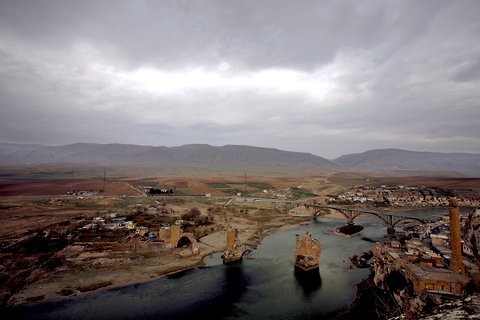|
The Turkey Analyst
Vol. 1 no. 11, 18 July 2008
ANALYSIS
Is a Secular Center-Right viable?
Halil Magnus Karaveli
The solution to Turkey’s regime crisis must logically be sought in the center of the political spectrum. However, the revival of the center-right force of Turkish politics represents a difficult challenge. For it to make a difference, the right must break with its tradition of playing with religion. An alternative must be formulated that is more stridently secular than what the center-right traditionally has been. But for it to be viable, such a centrist force needs simultaneously to be attractive to the conservative base of the centre-right, a challenging task.
Finding a Place: The PKK’s Effort to Remain Relevant
Svante E. Cornell
In early July, the PKK terrorist organization abducted three German climbers on Mt. Ararat, in an apparent revenge for Germany’s decision to ban the PKK’s mouthpiece, Denmark-based television channel Roj TV. The episode points to the PKK’s continuous difficulties in maintaining its claim to represent Kurdish opinion, faced with multiple challenges – from both the Turkish military and governing party, who otherwise agree on little; as well as the EU’s refusal to grant the PKK legitimacy and the Iraqi Kurdish parties’ success in making Iraqi Kurdistan the beacon of Kurdish hope, eclipsing the PKK. It remains to be seen whether the PKK will be successful in taking advantage of the current Turkish crisis.
NEWS DIGEST: THE FORTNIGHT IN REVIEW
I. What the Columnists Say
What chance does Turkish democracy stand? There is a growing pessimism among secular columnists about the prospects of democracy surviving the ongoing turmoil. They see democracy as being squeezed between religious authoritarianism and military rule. The closure of the AKP is now not taken for granted. Columnists who support the government have become confident that the party will survive. And the issue of whether or not secularism has taken root in society continues to preoccupy.
II. Domestic Politics
Summary: The fortnights politics were dominated by four major issues: continued developments in the AKP closure case; AKP founder Sener’s decision to form a new center party; the attack on police outside the US consulate in Istanbul; and the roundup of prominent figures in the Ergenekon investigation. Click here for full digest.
III. Foreign Relations
Summary: Foreign minister Babacan took part in the D-8 summit, while Prime Minister Erdogan took part in the Mediterranean summit in Paris, having received assurances that French plans will not affect Turkey’s EU candidacy. Click here for full digest.
RECENT ISSUES:
July 4, 2008 Issue (Click HERE for PDF)
– The Turkish Military’s Puzzling Silence
June 20, 2008 Issue (Click HERE for PDF)
– Interview with Suleyman Demirel
– What Went Wrong with Turkey’s Moderate Islamists?
June 4, 2008 Issue (Click HERE for PDF)
– Politics, Media and Power
– Where Did the Secular Republic Fail?
May 21, 2008 issue (Click HERE for PDF)
– Redefining Secularism? AKP Challenges Turks’ Modern Religiosity
May 8, 2008 issue
– The CHP Congress, Leeadership Cults, and Turkish Democracy
April 23, 2008 issue (Click HERE for PDF)
– Will Clinging to Atatürk and the EU save the AKP?
– Turkey’s Energy Policy between Political Crises
April 9, 2008 issue: (Click HERE for PDF)
– What animates Turkey’s secular opposition?
– Turkey and the EU: Beyond the Cyprus Imbroglio
March 26, 2008 issue: (Click HERE for PDF)
– Challenging Times for Turkey’s Democracy
– Foreign Policy Implications of the Turkish Crisis
March 12, 2008 issue:
– Erdogan’s Towering Role in the AKP
February 22, 2008 issue:
– Turkey in 2007: Key Developments
– Can Turkey’s Regime Crisis be Diffused? |
The Turkey Analyst
The Turkey Analyst is a publication of the Central Asia-Caucasus Institute & Silk Road Studies Joint Center, designed to bring authoritative analysis and news on the rapidly developing domestic and foreign policy issues in Turkey. It is published weekly, and includes a topical analysis, as well as translations and summaries of selected Turkish news reports. It is edited and compiled under the supervision of Svante E. Cornell, Halil M. Karaveli, and M. K. Kaya.
CLICK HERE
FOR PDF VERSION
The analyses appearing in the Turkey Analyst are unsigned, being the consensus view of the three Editors. The Turkey Analyst occasionally publishes signed guest analyses, which are normally solicited. To email the editors, click here.
The Joint Center
The Joint Center, created in 2005, is the product of the merger of the Central Asia-Caucasus Institute, at Johns Hopkins University’s School of Advanced International Studies, and the Silk Road Studies Program, at the Stockholm-based Institute for Security and Development Policy.
The Turkey Initiative
The Joint Center launched a Turkey Initiative in 2006 in order to improve understand of Turkish domestic and foreign affairs in Europe and the United States.
To Subscribe:
To subscribe to the Turkey Analyst email announcements, please contact Martina Klimesova with an email containing “subscribe Turkey Analyst” in the subject line.
|


Leave a Reply